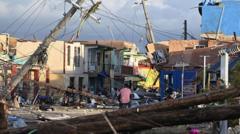Could Climate Change Have Fueled Hurricane Melissa's Intensity?

Published: 2025-11-06 16:00:32 | Category: world
Hurricane Melissa made history as one of the most powerful hurricanes to strike the Caribbean, making landfall in Black River, Jamaica, on 29 October as a Category 5 storm. With winds reaching 185 mph, Melissa's impact was devastating, exacerbated by climate change, which studies suggest amplified its intensity and rainfall significantly. The event highlights urgent concerns about climate change and its role in increasing the frequency and strength of hurricanes in the region.
Last updated: 12 October 2023 (BST)
What’s happening now
As the aftermath of Hurricane Melissa unfolds, Black River and other affected areas in Jamaica are facing extensive recovery challenges. The storm's powerful winds and torrential rains have caused significant destruction to infrastructure, homes, and agricultural land. Recovery efforts are underway, with local and international agencies mobilising resources and support for those impacted. Additionally, conversations around climate change and disaster preparedness are becoming increasingly urgent as the world prepares for the upcoming COP30 climate conference.
Key takeaways
- Hurricane Melissa made landfall in Jamaica as a Category 5 hurricane on 29 October 2023.
- The storm intensified rapidly due to warmer-than-average sea temperatures, made six times more likely by climate change.
- Climate change is linked to increased wind speeds and rainfall associated with hurricanes like Melissa.
- Significant damage has occurred in Jamaica and Cuba, with recovery efforts already underway.
- The upcoming COP30 conference highlights the need for global action on climate change.
Timeline: how we got here
The following timeline outlines key events leading to Hurricane Melissa's impact on Jamaica and the Caribbean:
- 25 October 2023: A tropical storm forms in the Caribbean Sea.
- 26 October 2023: The storm rapidly intensifies to a Category 4 hurricane.
- 29 October 2023: Hurricane Melissa makes landfall in Black River, Jamaica, as a Category 5 hurricane.
- 30 October 2023: The hurricane makes a second landfall in eastern Cuba.
- 10 November 2023: COP30 climate conference begins in Belém, Brazil.
What’s new vs what’s known
New today/this week
Recent studies have highlighted the connection between climate change and the rapid intensification of hurricanes, with Hurricane Melissa serving as a critical example. The World Weather Attribution study indicates that climate change made the extreme conditions leading to Melissa's intensity six times more likely.
What was already established
It is already known that warmer ocean temperatures can fuel hurricanes, contributing to their strength and frequency. However, the specific impact of climate change on individual storms has been less clear until recent analyses provided concrete data on rainfall and wind speed increases associated with Melissa.
Impact for the UK
Consumers and households
The repercussions of Hurricane Melissa will likely resonate beyond the Caribbean, affecting global supply chains and commodity prices, especially for agricultural products from the region. UK consumers may see changes in the prices of goods, particularly those imported from Jamaica and Cuba.
Businesses and jobs
For UK businesses with ties to the Caribbean, particularly in agriculture and tourism, the destruction caused by Melissa could result in disruptions to supply chains and reduced availability of products. The recovery phase will also affect job markets in the region, which may have downstream effects on UK companies reliant on Caribbean exports.
Policy and regulation
The UK government and businesses are likely to reassess climate policies in light of the destruction caused by extreme weather events like Hurricane Melissa. With the COP30 conference approaching, there may be renewed calls for stronger climate action and adaptation strategies to better prepare for future storms.
Numbers that matter
- 185 mph: Maximum wind speed recorded during Hurricane Melissa.
- 1.5°C: The average temperature increase of Caribbean Sea waters that contributed to the storm's rapid intensification.
- 700,000: The number of people evacuated in Cuba ahead of the storm.
- 16%: Increase in extreme rainfall associated with Hurricane Melissa due to climate change, as per the Imperial College Storm Model.
- 6 times: Greater likelihood of the conditions leading to Hurricane Melissa's intensity, attributed to climate change.
Definitions and jargon buster
- Category 5 hurricane: The highest classification of hurricanes, with wind speeds exceeding 157 mph.
- Climate change: Long-term changes in temperature and typical weather patterns in a place, primarily driven by human activities.
- World Weather Attribution: A collaborative research initiative that uses statistical methods to assess the impact of climate change on extreme weather events.
- Storm surge: An abnormal rise of water generated by a storm, often leading to flooding in coastal areas.
How to think about the next steps
Near term (0–4 weeks)
Immediate recovery efforts will be critical in Jamaica and Cuba, with an emphasis on assessing damage and providing humanitarian assistance. The focus will also be on restoring essential services, such as water and power, to affected communities.
Medium term (1–6 months)
As recovery progresses, attention will shift to long-term rebuilding efforts. This may include infrastructure improvements to withstand future storms and the implementation of better disaster preparedness measures.
Signals to watch
- Updates on recovery efforts from local and international agencies.
- Changes in commodity prices linked to agricultural exports from the Caribbean.
- Discussions and outcomes from the COP30 climate conference that may impact future climate policies.
Practical guidance
Do
- Stay informed about recovery efforts in affected areas.
- Support charities and organisations providing aid to those impacted by Hurricane Melissa.
- Prepare for potential changes in prices for imported goods from the Caribbean.
Don’t
- Ignore updates on climate change discussions following the storm.
- Assume that recovery will be quick; damage assessments will take time.
- Neglect the importance of disaster preparedness in your own community.
Checklist
- Review emergency plans for your household in case of extreme weather.
- Monitor local and international news for updates on Hurricane Melissa's aftermath.
- Consider supporting local businesses and charities in affected areas.
- Stay updated on climate policies discussed at COP30.
- Engage in local environmental initiatives to combat climate change.
Risks, caveats, and uncertainties
The data regarding the impacts of climate change on hurricanes continues to evolve. While the connections drawn in studies like those from World Weather Attribution are compelling, ongoing research is necessary to fully understand the complexities of these relationships. Additionally, the social and economic recovery of Jamaica and Cuba will depend on various factors, including international support and local governance.
Bottom line
Hurricane Melissa serves as a stark reminder of the growing risks associated with climate change and the urgent need for comprehensive disaster preparedness and recovery strategies. As the Caribbean faces increasingly severe weather events, the global community must recognise the importance of climate action to mitigate future impacts.
FAQs
What is Hurricane Melissa's impact on Jamaica?
Hurricane Melissa caused significant destruction in Jamaica, particularly in Black River, with high winds and heavy rainfall leading to extensive damage to infrastructure and homes.
How does climate change affect hurricanes like Melissa?
Climate change has been linked to increased hurricane intensity, with warmer sea temperatures and altered atmospheric conditions contributing to more powerful storms and extreme rainfall.
What are the next steps for recovery in affected areas?
The immediate focus for recovery will involve assessing damage, providing humanitarian aid, and restoring essential services in Jamaica and Cuba, followed by long-term rebuilding efforts.



